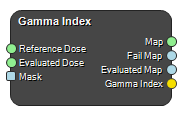Gamma Index
Class: NodeDoseGammaIndex

Calculates the gamma index, first introduced by Low et al, between a reference and an evaluation dose distribution in 3D with sub-voxel accuracy according to the algorithm described by Wendling et al. It will only calculate the gamma index for reference voxels >0.
Definition of the gamma index
The gamma index combines the dose difference and the distance difference into a dimensionless metric. In principle, this metric should be calculated for each reference point against all points in the evaluated dose distribution. The gamma statistic is calculated as
where \(\delta r\) is the distance criterion (distance to agreement or DTA) and \(\delta D\) is the dose difference criterion. The \(\gamma\) is then taken as the minimum \(\Gamma\) value over all evaluated points. If \(\gamma < 1\), that point will pass. Standard values for \(\delta r\) is 3 mm and \(\delta D\) is 3%, and a standard value for accepting agreement between two distributions is usually that 97% of all evaluated points should pass.
Example workflows
Inputs
Reference Dose
An image containing the dose matrix to be used as reference. This image is normally produced by importing a DICOM RT DOSE, or RD file.
Type: Image4DFloat, Required, Single
Evaluated Dose
An image containing the dose matrix to be evaluated. This image is normally produced by importing a DICOM RT DOSE, or RD file. It must have the same matrix size as the reference dose.
Type: Image4DFloat, Required, Single
Mask
A mask which specifies in which area the gamma index should be evaluated. It only applies to points in the evaluated dose. It must have the same matrix size as the reference dose.
Type: Image4DBool, Optional, Single
Outputs
Map
A parameter map which contains the \(\gamma\) values.
Type: Image4DFloat
Fail Map
A binary image which is True where \(\gamma > 1\), i.e. failed points.
Type: Image4DBool
Evaluated Map
A binary image which is True for points that have been included in the evaluation.
Type: Image4DBool
Gamma Index
A table which contains information on the gamma evaluation, such as names of the evaluated distributions, the number of evaluated voxels and the gamma pass rate.
Type: DataCollection
Settings
Sample Step Size(mm) Number
Determines the resolution of the evaluation, i.e. the accuracy of the interpolation. Recommended step size is at most 1/3 of the distance to agreement (DTA) and a fraction of the resolution of the voxel size. As an example, for a 1 mm DTA and voxel size of 2 mm, a step size of 0.25 mm would be suitable. Increasing resolution increases computation time.
Prescribed Dose(Gy) Number
The dose to which the dose criteria is related to if the option Use Local Dose Reference is not selected. I.e. if a 3% dose criterion is chosen and the prescribed dose is 10 Gy, the absolute dose difference criteria in the gamma calculations will be 0.3 Gy.
Use Local Dose Reference Boolean
If comparing the gamma distribution on a local level, i.e. not normalized to the prescribed dose, this option should be activated. This will check the dose difference at each individual sample point and normalize it to the dose level in the current reference voxel.
Dose Criteria(%) Number
Sets the dose criteria.
Distance Criteria(mm) Number
Sets the distance criteria, or distance to agreement.
Search Radius(mm) Number
Sets the radius of the sphere around each evaluated voxel to evaluate the gamma index for. If the user desires a pass/fail gamma evaluation, the Search Radius can be set equal to Distance Criteria. If a more thorough evaluation is desired, set the Search Radius to at least 3 times the Distance Criteria. Increasing the search radius increases the computation time.
References
1. Low D a, Harms WB, Mutic S, et al. A technique for the quantitative evaluation of dose distributions. Med. Phys. 1998;25:656–61.
2. Wendling M, Zijp LJ, McDermott LN, et al. A fast algorithm for gamma evaluation in 3D. Med. Phys. 2007;34:1647–54.
See also
Keywords:
Copyright © 2022, NONPI Medical AB
